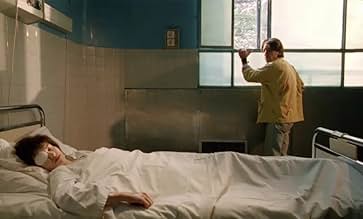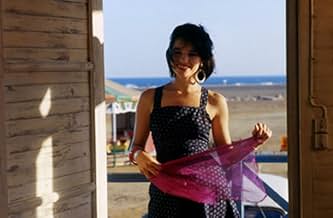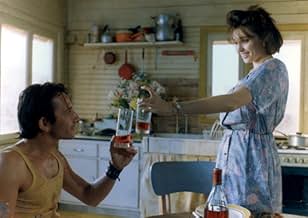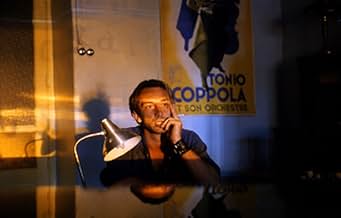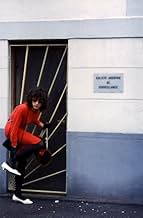
Play clip2:05
Watch Betty Blue: The Director's Cut (Zorg Arrives Home To Find Betty Gone)
A lackadaisical handyman and aspiring novelist tries to support his younger girlfriend as she slowly succumbs to madness.A lackadaisical handyman and aspiring novelist tries to support his younger girlfriend as she slowly succumbs to madness.A lackadaisical handyman and aspiring novelist tries to support his younger girlfriend as she slowly succumbs to madness.
- Director
- Writers
- Stars
- Nominated for 1 Oscar
- 5 wins & 12 nominations total
Béatrice Dalle
- Betty
- (as Beatrice Dalle)
Gérard Darmon
- Eddy
- (as Gerard Darmon)
Clémentine Célarié
- Annie
- (as Clementine Celarié)
Nathalie Dalyan
- Maria
- (as Nataly Dalian)
André Julien
- Le vieux Georges
- (as Andre Julien)
Bernard Robin
- Deuxième locataire
- (as Bernard Robin)
- Director
- Writers
- All cast & crew
- Production, box office & more at IMDbPro
Featured reviews
The Betty of the title is like a shooting star; she runs hot and bright, but she's burning up. _Betty Blue_ chronicles a torrid affair between a waitress and a handyman, initially in a broken down seaside resort. Betty is both passionate and unstable, almost childlike, and initially it is outsiders who bear the brunt of her anger - the piggish owner of the seaside bungalows, for example, or the playboy publisher who rejects Zorg's novel.
However, as Betty becomes more unstable and begins her descent into insanity, this rage is increasingly turned inward into self-punishing and self-mutilating actions. The same intensity that drives her sexuality and her love for Zorg is, ultimately, her downfall.
Over the course of the movie, which is quite long (I saw the 178 minute director's cut), Zorg goes to increasingly frantic lengths both to please Betty and to protect her from herself. In this regard, certainly, Betty and Zorg are almost identical, both going to extremes, in their own ways, to defend their relationship from outside interference.
As well as providing a narrative that may be read and interpreted on several levels, _Betty Blue_ is an exceptionally beautiful film in terms of cinematography and mise en scene. Colour is used to breathtaking effect - the blue floors of the piano shop, the yellow car, the yellow lighting which makes it seem as though, regardless of time, it's always afternoon twilight. Landscapes, city scenes, interiors are all set up and filmed beautifully.
A tale of love, sex and obsession not to be missed.
However, as Betty becomes more unstable and begins her descent into insanity, this rage is increasingly turned inward into self-punishing and self-mutilating actions. The same intensity that drives her sexuality and her love for Zorg is, ultimately, her downfall.
Over the course of the movie, which is quite long (I saw the 178 minute director's cut), Zorg goes to increasingly frantic lengths both to please Betty and to protect her from herself. In this regard, certainly, Betty and Zorg are almost identical, both going to extremes, in their own ways, to defend their relationship from outside interference.
As well as providing a narrative that may be read and interpreted on several levels, _Betty Blue_ is an exceptionally beautiful film in terms of cinematography and mise en scene. Colour is used to breathtaking effect - the blue floors of the piano shop, the yellow car, the yellow lighting which makes it seem as though, regardless of time, it's always afternoon twilight. Landscapes, city scenes, interiors are all set up and filmed beautifully.
A tale of love, sex and obsession not to be missed.
A happy-go-lucky odd job man (Jean-Hugues Anglade as Zorg) falls in to a relationship with a slightly unhinged -- but very sexy/sexual -- French teenager named Betty (Béatrice Dalle in her debut role.)
There are very few films that are totally different from anything you have seen before. While sexually explicit -- it is far from objectionable because the two parties are in love and passionate about one another.
Betty Blue/37°2 le matin doesn't really fall in to any one category -- going from farce to tragedy, stopping off at oddball. The two leads are amazing in their chemistry -- they really do look and act like they are in love. Also what an amazing debut by the Dalle, although her later life has shown that she has plenty of the Betty Blue in her for real.
(Was this script written with her in mind? -- my search for the truth goes on.)
Starting the film with a sex scene sets the film off on the totally the wrong foot. While the film is about sex -- and at times sexual repression -- there are times when it looks like it was set in a nudist camp. Even Jean-Hugues Anglade strolls around with it all on show -- thankfully he looks like he has kept up his gym membership.
The scene in which Betty throws the whole of the fixtures and fittings of the beach apartment out of the window was stolen by a famous car advert (in the UK) and it really is a stretch of the imagination in that Zorg doesn't respond to it. He just paints on and lets her get on with it -- like he doesn't care.
(I think we all know how we would react in a similar situation and it wouldn't be like Zorg!)
This has great cinematography with every scene framed to perfection. The dour insides of the French household and the generally dirty oven and sink (usually with two weeks worth of dishes in them.) Very true if you know that part of the world!
The repeating, irregular, piano theme tune is what cinema is about -- when in the hands of people that know how to marry both mediums. Images and music fitting together to form a perfect marriage. Fantastic and moving.
The famous Roger Ebert of the Chicago Sun Times gives this low marks -- citing too much flesh being on display (among other faults) -- and this is sad given that he gave Kill Bill Part One top marks. A woman making love to a man she is in passionately in love with is tasteless -- a homicidal woman slicing the arms of a whole room of gangsters is OK?
Roger -- I respect you a great deal, but you are as wrong as Leslie Halliwell (author of the world's most famous film guide book) when he gave Close Encounters no stars at all.
You should come over here (Europe) a bit more. Walk about the beaches of France and Spain and look at the amount of flesh on display and the way people show affection for one another without glancing 'round to see who is looking. True it has one or two sex scenes too many -- as I hinted before -- but it is sex that means something and is about something.
Betty Blue is one of my top 200 films of all time and while it has its limits and its faults (it does sag a little in middle) it remains a powerful piece of work about living with crazy people and how easily good times can slip in to bad. I think if the sex was toned down and there was a bit more of the comedy/romance in the centre than this could easily be part of the IMDb top 200. Not that this really matters all that much.
A product that only the French could make and one gets under your skin and stays there.
This review is a reference to the original cinema cut.
There are very few films that are totally different from anything you have seen before. While sexually explicit -- it is far from objectionable because the two parties are in love and passionate about one another.
Betty Blue/37°2 le matin doesn't really fall in to any one category -- going from farce to tragedy, stopping off at oddball. The two leads are amazing in their chemistry -- they really do look and act like they are in love. Also what an amazing debut by the Dalle, although her later life has shown that she has plenty of the Betty Blue in her for real.
(Was this script written with her in mind? -- my search for the truth goes on.)
Starting the film with a sex scene sets the film off on the totally the wrong foot. While the film is about sex -- and at times sexual repression -- there are times when it looks like it was set in a nudist camp. Even Jean-Hugues Anglade strolls around with it all on show -- thankfully he looks like he has kept up his gym membership.
The scene in which Betty throws the whole of the fixtures and fittings of the beach apartment out of the window was stolen by a famous car advert (in the UK) and it really is a stretch of the imagination in that Zorg doesn't respond to it. He just paints on and lets her get on with it -- like he doesn't care.
(I think we all know how we would react in a similar situation and it wouldn't be like Zorg!)
This has great cinematography with every scene framed to perfection. The dour insides of the French household and the generally dirty oven and sink (usually with two weeks worth of dishes in them.) Very true if you know that part of the world!
The repeating, irregular, piano theme tune is what cinema is about -- when in the hands of people that know how to marry both mediums. Images and music fitting together to form a perfect marriage. Fantastic and moving.
The famous Roger Ebert of the Chicago Sun Times gives this low marks -- citing too much flesh being on display (among other faults) -- and this is sad given that he gave Kill Bill Part One top marks. A woman making love to a man she is in passionately in love with is tasteless -- a homicidal woman slicing the arms of a whole room of gangsters is OK?
Roger -- I respect you a great deal, but you are as wrong as Leslie Halliwell (author of the world's most famous film guide book) when he gave Close Encounters no stars at all.
You should come over here (Europe) a bit more. Walk about the beaches of France and Spain and look at the amount of flesh on display and the way people show affection for one another without glancing 'round to see who is looking. True it has one or two sex scenes too many -- as I hinted before -- but it is sex that means something and is about something.
Betty Blue is one of my top 200 films of all time and while it has its limits and its faults (it does sag a little in middle) it remains a powerful piece of work about living with crazy people and how easily good times can slip in to bad. I think if the sex was toned down and there was a bit more of the comedy/romance in the centre than this could easily be part of the IMDb top 200. Not that this really matters all that much.
A product that only the French could make and one gets under your skin and stays there.
This review is a reference to the original cinema cut.
It was ten years ago when I saw the two hour version. Watching the director's cut was like seeing it for the first time. This version concentrated more on Jean-Hugues' character Zorg and his love and devotion to the mentally disintegrating Betty. The story takes its time, allowing us to understand Betty's illness and appreciate Zorg's erratic behaviour. The English title can be off putting because the expectations focus on the character Betty, played brilliantly by Dalle.
In music, a "blue note" is a note which departs from the expected major scale and instead goes minor (flat). You've heard it a million times in blues or jazz; it's "that note" that makes you go "oooooooh". In the film "Betty Blue", a meticulously crafted, deeply symbolic, allegorical tale of passion and madness, there's a wonderful scene where the 2 main characters slip away from a funeral wake in the middle of the night, find a room of pianos and play an impromptu duet. In this scene, the man and stable component of the relationship, Zorg, plays a chord progression while Betty, the volatile component, comes in with a simple melody hitting that powerful blue note.
Why am I harping on this one scene? It's because it shows how carefully planned and meaningful this film is right down to the music. And we haven't even touched the visuals: the incredibly surreal lighting, colors and set design, or the first class acting from everyone involved, or the hypercharged story itself. This is one of those films like "Citizen Kane" which experts can spend decades dissecting on a technical as well as artistic level. Whether you approach it like that, or whether you just sit back and take in the experience, either way, this film works.
"Betty Blue" is, on the surface, a love story. Underneath the surface it's the quintessential story of an artist and muse. Zorg is the artist (in this case, a failed writer) while Betty is the muse, a powerful, passionate force that suddenly drops in on him, adoring his simple scribblings to the point of obsessive madness, forcing her own passion upon him and driving him to write and believe in himself even though he barely knows or cares what he's doing. He simply wants to hold on to Betty as if his entire being depends on her because he knows what a rare force she is.
If you happen to be a writer, artist, musician, inventor, or anyone with creative leanings, you'll really grasp this angle. Even if you're not in those fields, you'll still grasp the story of a person who finds pure passion and will do anything to keep it.
Although I'm describing this story from Zorg's perspective, the movie is really about Betty. Zorg is almost just a bystander in his own life, experiencing the passion, volatility and violence of his lover. I thought this was a fantastic angle, even though you may be perplexed at his lack of reactions in some cases. For example early in the film Betty has a big flipout and throws all of Zorg's earthly belongings out the window. Zorg watches from afar with hilarious detachment, chatting calmly with a neighbor as if they're watching waves break on the beach. The film is full of surreal/comical moments like that, and that's what offsets the brutality of it all. Think of it: if your lover flipped out and destroyed everything you own, it probably wouldn't feel like a beautiful, artistic moment. But in this film it is. It's magnificent and oddly triumphant at the end of the scene.
Ok now the disclaimer: "Betty Blue" is a tough film for American audiences. This is mainly because there's a ton of very explicit nudity and sexuality bordering on softcore porn. Do NOT watch this with your parents. And for the love of all that's holy do NOT watch it with your kids. Honestly I wouldn't watch it with anyone because I would feel so uncomfortable. Full frontal nudity, both genders, kissing of private parts, and of course there's that opening scene: a brutally voyeuristic shot of the two having sex for a solid minute or two without any cuts, dialogue or distractions. But if you can handle that first scene, then your all set. Oddly enough, this film doesn't try to be erotic. It's hard to describe, but the explicit sex scenes convey passion without necessary getting bogged down in eroticism, thus avoiding any cheese factor that often comes when filmmakers try too hard to be sexy.
It may also be a difficult film for American audiences because it's just plain long (assuming you watch the 3-hr director's cut which you should). There isn't a clear, summarizable plot. The entire story is somewhat episodic and random, with sudden bizarre life changes happening that change the entire backdrop of the film. But this is precisely the point. Almost like a weird Alice in Wonderland fantasy, you have the main character(s) and everyone else is peripheral, everything surrounding them is surreal and inexplicable. This creates a sort of bubble around Betty and Zorg where we the audience feel what they feel: that the only thing that matters in the world is their love for each other.
I highly recommend this film to anyone who goes to the cinema for more than thrills and popcorn. I would rank "Betty Blue" up there with other artistic masterpieces by Kubrick ("Clockwork Orange", "2001") or Kieslowsky (Blue, White, Red Trilogy) or Wim Wenders ("Paris, Texas", "Wings of Desire", "Until the End of the World"). All of these films are somewhat difficult to watch because they're not easily digestible entertainment, and unfortunately that's why they're not marketed here and you'll probably drop a few bills ordering a rare import copy, but it's worth it.
Why am I harping on this one scene? It's because it shows how carefully planned and meaningful this film is right down to the music. And we haven't even touched the visuals: the incredibly surreal lighting, colors and set design, or the first class acting from everyone involved, or the hypercharged story itself. This is one of those films like "Citizen Kane" which experts can spend decades dissecting on a technical as well as artistic level. Whether you approach it like that, or whether you just sit back and take in the experience, either way, this film works.
"Betty Blue" is, on the surface, a love story. Underneath the surface it's the quintessential story of an artist and muse. Zorg is the artist (in this case, a failed writer) while Betty is the muse, a powerful, passionate force that suddenly drops in on him, adoring his simple scribblings to the point of obsessive madness, forcing her own passion upon him and driving him to write and believe in himself even though he barely knows or cares what he's doing. He simply wants to hold on to Betty as if his entire being depends on her because he knows what a rare force she is.
If you happen to be a writer, artist, musician, inventor, or anyone with creative leanings, you'll really grasp this angle. Even if you're not in those fields, you'll still grasp the story of a person who finds pure passion and will do anything to keep it.
Although I'm describing this story from Zorg's perspective, the movie is really about Betty. Zorg is almost just a bystander in his own life, experiencing the passion, volatility and violence of his lover. I thought this was a fantastic angle, even though you may be perplexed at his lack of reactions in some cases. For example early in the film Betty has a big flipout and throws all of Zorg's earthly belongings out the window. Zorg watches from afar with hilarious detachment, chatting calmly with a neighbor as if they're watching waves break on the beach. The film is full of surreal/comical moments like that, and that's what offsets the brutality of it all. Think of it: if your lover flipped out and destroyed everything you own, it probably wouldn't feel like a beautiful, artistic moment. But in this film it is. It's magnificent and oddly triumphant at the end of the scene.
Ok now the disclaimer: "Betty Blue" is a tough film for American audiences. This is mainly because there's a ton of very explicit nudity and sexuality bordering on softcore porn. Do NOT watch this with your parents. And for the love of all that's holy do NOT watch it with your kids. Honestly I wouldn't watch it with anyone because I would feel so uncomfortable. Full frontal nudity, both genders, kissing of private parts, and of course there's that opening scene: a brutally voyeuristic shot of the two having sex for a solid minute or two without any cuts, dialogue or distractions. But if you can handle that first scene, then your all set. Oddly enough, this film doesn't try to be erotic. It's hard to describe, but the explicit sex scenes convey passion without necessary getting bogged down in eroticism, thus avoiding any cheese factor that often comes when filmmakers try too hard to be sexy.
It may also be a difficult film for American audiences because it's just plain long (assuming you watch the 3-hr director's cut which you should). There isn't a clear, summarizable plot. The entire story is somewhat episodic and random, with sudden bizarre life changes happening that change the entire backdrop of the film. But this is precisely the point. Almost like a weird Alice in Wonderland fantasy, you have the main character(s) and everyone else is peripheral, everything surrounding them is surreal and inexplicable. This creates a sort of bubble around Betty and Zorg where we the audience feel what they feel: that the only thing that matters in the world is their love for each other.
I highly recommend this film to anyone who goes to the cinema for more than thrills and popcorn. I would rank "Betty Blue" up there with other artistic masterpieces by Kubrick ("Clockwork Orange", "2001") or Kieslowsky (Blue, White, Red Trilogy) or Wim Wenders ("Paris, Texas", "Wings of Desire", "Until the End of the World"). All of these films are somewhat difficult to watch because they're not easily digestible entertainment, and unfortunately that's why they're not marketed here and you'll probably drop a few bills ordering a rare import copy, but it's worth it.
Is there one movie you've watched every night for a week? This was mine and I remember that strange feeling you get that every movie to follow will be disappointing in comparison. This movie was extraordinary in sight, sound, emotion, character. In overview it becomes a bit disjointed at a point, and the ending while powerful may not score high in originality. The rest is a masterpiece. This impact remains high because of some of the parallels to relationships I've had... I recall going to the company store on a business trip to Korea. One movie poster hung in the window, Beatrice Dalle in blue...
Did you know
- Trivia"37,2 Le Matin" - the French title of the film, is a woman's body temperature in Celsius, when she is ovulating.
- GoofsWhen Eddy's mother is lying dead on the bed, she is clearly breathing.
- Alternate versionsAlso available in a 178 minute Director's Cut version.
- ConnectionsFeatured in 100 Greatest Sexy Moments (2003)
- SoundtracksBetty Et Zorg
Written and Performed by Le Grand Orchestre De Gabriel Yared
Details
- Release date
- Country of origin
- Official site
- Language
- Also known as
- Betty Blue
- Filming locations
- Gruissan, Aude, France(beach resort)
- Production companies
- See more company credits at IMDbPro
Box office
- Gross US & Canada
- $2,016,851
- Opening weekend US & Canada
- $29,383
- Nov 9, 1986
- Gross worldwide
- $2,016,851
Contribute to this page
Suggest an edit or add missing content


![Bande-annonce [OV]](https://m.media-amazon.com/images/M/MV5BMDAyNWU0OWQtYjdiMC00ZWU5LWI4MmItZjdhMjBiMTc0MDk4XkEyXkFqcGdeQXRodW1ibmFpbC1pbml0aWFsaXplcg@@._V1_QL75_UX500_CR0)




